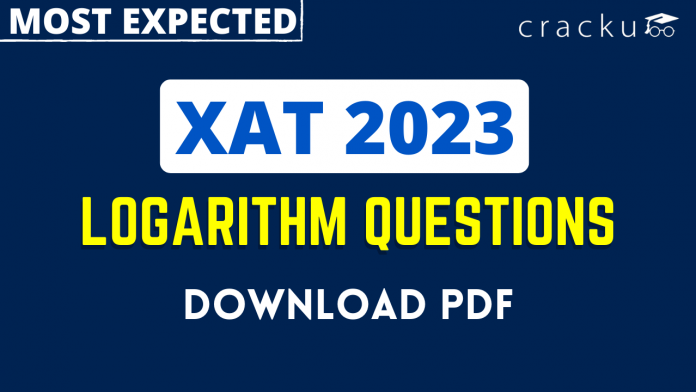Logarithm Questions for XAT 2023 – Solved Questions with Detailed Answers PDF
Download Logarithm Questions for XAT PDF – XAT Logarithm questions PDF by Cracku. Practice XAT solved Logarithm Questions paper tests, which are the practice question to have a firm grasp on the Logarithm topic in the XAT exam. Top 20 very Important Logarithm Questions for XAT based on asked questions in previous exam papers. This PDF contains the most important Logarithm questions with detailed video solutions. Click on the below link to download the PDF of the Logarithm questions for XAT 2023.
Download Logarithm Questions for XAT 2023
Enroll to XAT 2023 Crash Course
Question 1: If $log_3 2, log_3 (2^x – 5), log_3 (2^x – 7/2)$ are in arithmetic progression, then the value of x is equal to
a) 5
b) 4
c) 2
d) 3
1) Answer (D)
Solution:
$2 log (2^x – 5) = log 2 + log (2^x – 7/2)$
Let $2^x = t$
=> $(t-5)^2 = 2(t-7/2)$
=> $t^2 + 25 – 10t = 2t – 7$
=> $t^2 – 12t + 32 = 0$
=> t = 8, 4
Therefore, x = 2 or 3, but $2^x$ > 5, so x = 3
Question 2: Let $u = ({\log_2 x})^2 – 6 {\log_2 x} + 12$ where x is a real number. Then the equation $x^u = 256$, has
a) no solution for x
b) exactly one solution for x
c) exactly two distinct solutions for x
d) exactly three distinct solutions for x
2) Answer (B)
Solution:
$x^u = 256$
Taking log to the base 2 on both the sides,
$u * \log_{2}{x} = \log_{2}{256}$
=>$[({\log_2 x})^2 – 6 {\log_2 x} + 12] * \log_{2}{x} = 8$
$(log_2 x)^3 – 6(log_2 x)^2 + 12log_2 x = 8$
Let $log_2 x = t$
$t^3 – 6t^2 +12t – 8 = 0$
$(t-2)^3 = 0$
Therefore, $log_2 x = 2$
=> $x = 4$ is the only solution
Hence, option B is the correct answer.
Question 3: If $log_y x = (a*log_z y) = (b*log_x z) = ab$, then which of the following pairs of values for (a, b) is not possible?
a) (-2, 1/2)
b) (1,1)
c) (0.4, 2.5)
d) ($\pi$, 1/ $\pi$)
e) (2,2)
3) Answer (E)
Solution:
$log_y x = ab$
$a*log_z y = ab$ => $log_z y = b$
$b*log_x z = ab$ => $log_x z = a$
$log_y x$ = $log_z y * log_x z$ => $log x/log y$ = $log y/log z * log z/log x$
=> $\frac{log x}{log y} = \frac{log y}{log x}$
=> $(log x)^2 = (log y)^2$
=> $log x = log y$ or $log x = -log y$
So, x = y or x = 1/y
So, ab = 1 or -1
Option 5) is not possible
Question 4: If x >= y and y > 1, then the value of the expression $log_x (x/y) + log_y (y/x)$ can never be
a) -1
b) -0.5
c) 0
d) 1
4) Answer (D)
Solution:
$log_x (x/y) + log_y (y/x)$ = $1 – log_x (y) + 1 – log_y (x)$
= $2 – (log_x y + 1/log_x y)$ <= 0 (Since $log_x y + 1/log_x y$ >= 2)
So, the value of the expression cannot be 1.
Question 5: If $f(x) = \log \frac{(1+x)}{(1-x)}$, then f(x) + f(y) is
a) $f(x+y)$
b) $f{\frac{(x+y)}{(1+xy)}}$
c) $(x+y)f{\frac{1}{(1+xy)}}$
d) $\frac{f(x)+f(y)}{(1+xy)}$
5) Answer (B)
Solution:
If $f(x) = \log \frac{(1+x)}{(1-x)}$ then $f(y) = \log \frac{(1+y)}{(1-y)}$
Also Log (A*B)= Log A + Log B
f(x)+f(y) = $ \log \frac{(1+x)(1+y)}{(1-x)(1-y)}$
=$\log\frac{\left(1+xy\ +x\ +y\right)}{\left(1+xy-x-y\right)}$
Dividing numberator and denominator by (1+xy)
$\log\frac{\frac{\left(1+xy\ +x\ +y\right)}{1+xy}}{\frac{\left(1+xy-x-y\right)}{1+xy}}$
=$\log\frac{\frac{1+xy\ }{1+xy}+\frac{\left(x+y\right)}{1+xy}}{\frac{1+xy\ }{1+xy}-\frac{\left(x+y\right)}{1+xy}}$
= $\log { \frac{1+ \frac{(x+y)}{(1+xy)}}{1- \frac{(x+y)}{(1+xy)}}}$
Hence option B.
Question 6: If $\log_{2}{\log_{7}{(x^2 – x+37)}}$ = 1, then what could be the value of ‘x’?
a) 3
b) 5
c) 4
d) None of these
6) Answer (C)
Solution:
$\log_{2}{\log_{7}{(x^2 – x+37)}}$ = 1
$\log_{7}{(x^2 – x+37)}$ = $2$
$(x^2 – x+37)$ = $7^{2}$
Given eq. can be reduced to $x^2 – x + 37 = 49$
So x can be either -3 or 4.
Question 7: If $\log_{2}{x}.\log_{\frac{x}{64}}{2}=\log_{\frac{x}{16}}{2}$. Then x is
a) 2
b) 4
c) 16
d) 12
7) Answer (B)
Solution:
$\log_{2}{x}.\log_{\frac{x}{64}}{2}=\log_{\frac{x}{16}}{2}$
i.e. $\frac{log{x}}{log{2}} * \frac{log_{2}}{log{x}-log{64}} = \frac{log{2}}{log{x}-log{16}}$
i.e. $\frac{log{x} * (log{x}-log{16})}{log{x}-log{64}}$ = $\log{2}$
let t = log x
Therefore, $\frac{t * (t-log{16})}{t-log{64}}$ = $\log{2}$
$t^2-4*log 2*t = t*log 2-6*(log 2)^2$
I.e. $t^2-5*log 2*t-6*(log 2)^2$ = 0
I.e. $t^2-3*log 2*t-2*log 2*t-6*(log 2)^2$ = 0
i.e. $t*(t-3*log 2)-2*log 2*(t-3*log 2)$ = 0
i.e $t=2*log 2$ or $t=3*log 2$
i.e $log x=log 4$ or $log x=log 8$
therefore $x=4$ or $8$
therefore our answer is option ‘B’
Question 8: What is the value of $\sqrt{\frac{a}{b}}$, If $\log_{4}\log_{4}4^{a-b}=2\log_{4}(\sqrt{a}-\sqrt{b})+1$
a) -5/3
b) 2
c) 5/3
d) 1
8) Answer (C)
Solution:
$\sqrt{\frac{a}{b}}$, If $\log_{4}\log_{4}4^{a-b}=2\log_{4}(\sqrt{a}-\sqrt{b})+\log_{4}{4}$
i.e. $\log_{4}\log_{4}4^{a-b}=\log_{4}((\sqrt{a}-\sqrt{b})^2)*4$
i.e. $\log_{4}4^{a-b}=((\sqrt{a}-\sqrt{b})^2)*4$
i.e. (a-b)*$\log_{4}4=((\sqrt{a}-\sqrt{b})^2)*4$
i.e. a-b = 4a+4b-8$\sqrt{ab}$
i.e. 3a + 5b – 8$\sqrt{ab}$ = 0
i.e. $3\sqrt\frac{a}{b}^2$ – 8$\sqrt\frac{a}{b}$+5 = 0
put $\sqrt\frac{a}{b}$ = t
therefore 3$t^2$ – 8t + 5 = 0
solving we get t = 1 or t = $\frac{5}{3}$
i.e. $\sqrt\frac{a}{b}$ = 1 or $\frac{5}{3}$
but if $\sqrt\frac{a}{b}$ = 1 then a=b then $\log_{4}(\sqrt{a}-\sqrt{b})$ will become indefinite
Therefore $\sqrt\frac{a}{b}$ = $\frac{5}{3}$
Therefore our answer is option ‘C’
Question 9: Find the value of x from the following equation:
$\log_{10}{3}+\log_{10}(4x+1)=\log_{10}(x+1)+1$
a) 2/7
b) 7/2
c) 9/2
d) None of the above
9) Answer (B)
Solution:
$\log_{10}{3}+\log_{10}(4x+1)=\log_{10}(x+1)+1$ can be written as
$\log_{10}{3}+\log_{10}(4x+1)=\log_{10}(x+1)+\log_{10}{10}$
We know that $\log_{10}{a}+\log_{10}{b}=\log_{10}{ab}$
$\log_{10}{3*(4x+1)}=\log_{10}{(x+1)*10}$
$12x+3=10x+10$
$x=7/2$. Hence, option B is the correct answer.
Question 10: If $\log{3}, log(3^{x} – 2)$ and $log (3^{x}+ 4)$ are in arithmetic progression, then x is equal to
a) $\frac{8}{3}$
b) $\log_{3}{8}$
c) $\log_{2}{3}$
d) $8$
10) Answer (B)
Solution:
If $log{3}, log(3^{x} – 2)$ and $log (3^{x}+ 4)$ are in arithmetic progression
Then, $2*log(3^{x} – 2) = log{3}+log (3^{x}+ 4)$
Thus, $log{(3^{x} – 2)^2} = log{3(3^x+4)}$
Thus, $(3^{x} – 2)^2 = 3(3^x+4)$
=> $3^{2x} – 4*3^x +4 = 3*3^x + 12$
=> $3^{2x} – 7*3^x – 8 = 0$
=> $(3^x+1)*(3^x-8) = 0$
But $3^x+1 \neq 0$
Thus, $3^x = 8$
Hence, $x = log_{3}{8}$
Hence, option B is the correct answer.
Question 11: If $log_{10} x – log_{10} \sqrt[3]{x} = 6log_{x}10$ then the value of x is
a) 10
b) 30
c) 100
d) 1000
11) Answer (D)
Solution:
$\log_{10} x – \log_{10} \sqrt[3]{x} = 6\log_{x}10$
Thus, $\dfrac{\log {x}}{\log {10}}$ – $\dfrac{1}{3}*\dfrac{\log {x}}{\log {10}}$ = $6*\dfrac{\log{10}}{\log{x}}$
=> $\dfrac{2}{3}*\dfrac{\log {x}}{\log {10}}$ = $6*\dfrac{\log{10}}{\log{x}}$
Thus, => $\dfrac{1}{9}*(\log{x})^2 = (\log{10})^2=1$
Thus, $(\log{x})^2 = 9$
Thus $\log x = 3$ or $-3$
Thus, $ x = 1000$ or $\dfrac{1}{1000}$
From amongst the given options, 1000 is the correct answer.
Hence, option D is the correct answer.
Question 12: The value of $\text{log}_{7} \text{log}_{7} \sqrt{7(\sqrt{7\sqrt{7}})}$
a) 7
b) $\text{log}_7$ 2
c) $1-3 \text{log}_2$ 7
d) $1-3 \text{log}_7$ 2
12) Answer (D)
Solution:
$\text{log}_{7} \text{log}_{7} \sqrt{7(\sqrt{7\sqrt{7}})}$
= $\text{log}_{7} [\frac{1}{2} (\text{log}_{7} 7+\text{log}_{7} \sqrt{7(\sqrt{7})})]$
= $\text{log}_{7} [\frac{1}{2} (1 +\frac{1}{2}\text{log}_{7}{7(\sqrt{7})})]$
= $\text{log}_{7} [\frac{1}{2} (1 +\frac{1}{2}(1+1/2))]$
= $\text{log}_{7}\frac{7}{8}$
= $\text{log}_{7}7 – \text{log}_{7}8$
= $1-3 \text{log}_{7}2$
Hence, option D is the correct answer.
Question 13: $log_{13} log_{21} (\sqrt{x+21}+ \sqrt{x} ) =0 $ then the value of x is
a) 21
b) 13
c) 81
d) None of the above
13) Answer (D)
Solution:
$log_{13} log_{21} (\sqrt{x+21}+ \sqrt{x} ) =0 $
Thus, $log_{21} (\sqrt{x+21}+ \sqrt{x} ) = 1 $
Thus, $(\sqrt{x+21}+ \sqrt{x} ) = 21 $
Let, $\sqrt{x} = t$
Thus, $x = t^2$
Thus, $x+21 = t^2+21$
Thus, $\sqrt{t^2+21}+t = 21$
Thus, $(t^2+21) = (21-t)^2$
=> $t^2 + 21 = 441 – 42t + t^2$
=> $42t = 420$
Hence, $t = 10$
Hence, option D is the correct answer.
Question 14: The value of $\text{log}_{7} \text{log}_{7} \sqrt{7(\sqrt{7\sqrt{7}})}$
a) 7
b) $\text{log}_7$ 2
c) $1-3 \text{log}_2$ 7
d) $1-3 \text{log}_7$ 2
14) Answer (D)
Solution:
$\text{log}_{7} \text{log}_{7} \sqrt{7(\sqrt{7\sqrt{7}})}$
= $\text{log}_{7} [\frac{1}{2} (\text{log}_{7} 7+\text{log}_{7} \sqrt{7(\sqrt{7})})]$
= $\text{log}_{7} [\frac{1}{2} (1 +\frac{1}{2}\text{log}_{7}{7(\sqrt{7})})]$
= $\text{log}_{7} [\frac{1}{2} (1 +\frac{1}{2}(1+1/2))]$
= $\text{log}_{7}\frac{7}{8}$
= $\text{log}_{7}7 – \text{log}_{7}8$
= $1-3 \text{log}_{7}2$
Hence, option D is the correct answer.
Question 15: If $log_{25}{5}$ = a and $log_{25}{15} $ = b, then the value of $log_{25}{27}$ is:
a) 3(b+a)
b) 3(1-b-a)
c) 3(a+b-1)
d) 3(1-b+a)
15) Answer (C)
Solution:
$log_{25}{5}$ = a
=> a=1/2
$log_{25}{15}$ = $log_{25}{3}+log_{25}{5}$ = b
$\frac{1}{2} \log_{5}{3} + \frac{1}{2}$ = b
$\log_{5}{3}$ = 2(b – $\frac{1}{2})$………….(i)
$log_{25}{27}$ = $\frac{3}{2} \log_{5}{3}$………(ii)
Replacing $\log_{5}{3}$ = 2(b – $\frac{1}{2})$ in (ii) we get
$log_{25}{27}$ = 3(b – $\frac{1}{2}$)
We can write -$\frac{1}{2}$ as (- 1 + $\frac{1}{2}$) or (-1 + a)
So, $log_{25}{27}$ = 3(b + a – 1)
Hence, option C is the correct answer.
Question 16: Find the value of x which satisfies the following equation $4log_7 (x – 8) = log_3 81$
a) 8
b) 18
c) 20
d) None of the above
16) Answer (D)
Solution:
$4log_7 (x – 8) = log_3 81$
$4log_7 (x – 8) = log_3 3^{4}$
$4log_7 (x – 8) =4*log_3 3$
$log_7 (x – 8) =1$
$(x – 8) =7^{1}$
$x = 7+8$
$x = 15$
Question 17: $(1+5)\log_{e}3+\frac{(1+5^{2})}{2!}(\log_{e}3)^{2}+\frac{(1+5^{3})}{3!}(\log_{e}3)^{3}+…$
a) 12
b) 244
c) 243
d) 245
17) Answer (B)
Solution:
Splitting the above mentioned series into two series
A = $\log_{e}3+\frac{1}{2!}(\log_{e}3)^{2}+\frac{1}{3!}(\log_{e}3)^{3}+…$
B = $5\log_{e}3+\frac{5^{2}}{2!}(\log_{e}3)^{2}+\frac{5^{3}}{3!}(\log_{e}3)^{3}+…$
We know that $e^{x}$ =$1+x+\frac{x^{2}}{2!}+\frac{x^{3}}{3!}+…$
So $e^{x}-1$ = $x+\frac{x^{2}}{2!}+\frac{x^{3}}{3!}+…$
On solving two series A and B
A = $\log_{e}3+\frac{1}{2!}(\log_{e}3)^{2}+\frac{1}{3!}(\log_{e}3)^{3}+…$ =$e^{\log_{e}3}-1$ = $3-1$ =$2$
B = $5\log_{e}3+\frac{5^{2}}{2!}(\log_{e}3)^{2}+\frac{5^{3}}{3!}(\log_{e}3)^{3}+…$=$e^{\log_{e}3^{5}}-1$=$3^{5}-1$=$242$
A+B = $2 + 242$ = $244$
Question 18: Suppose, $\log_3 x = \log_{12} y = a$, where $x, y$ are positive numbers. If $G$ is the geometric mean of x and y, and $\log_6 G$ is equal to
a) $\sqrt{a}$
b) 2a
c) a/2
d) a
18) Answer (D)
Solution:
We know that $\log_3 x = a$ and $\log_{12} y=a$
Hence, $x = 3^a$ and $y=12^a$
Therefore, the geometric mean of $x$ and $y$ equals $\sqrt{x \times y}$
This equals $\sqrt{3^a \times 12^a} = 6^a$
Hence, $G=6^a$ Or, $\log_6 G = a$
Question 19: The value of $\log_{0.008}\sqrt{5}+\log_{\sqrt{3}}81-7$ is equal to
a) 1/3
b) 2/3
c) 5/6
d) 7/6
19) Answer (C)
Solution:
$\log_{0.008}\sqrt{5}+\log_{\sqrt{3}}81-7$
$81 = 3^4$ and $0.008 = \frac{8}{1000} = \frac{2^{3}}{10^{3}} = \frac{1}{5^{3}} = 5^{-3} $
Hence,
$\log_{0.008}\sqrt{5}+ 8 -7 $
$ \log_{5^{-3}}5^{\frac{1}{2}}+ 8 -7 $
$\frac{log 5^{0.5}}{log 5^{-3}} + 1$
$ – \frac{1}{6} + 1$
= $\frac{5}{6}$
Question 20: If x is a real number such that $\log_{3}5= \log_{5}(2 + x)$, then which of the following is true?
a) 0 < x < 3
b) 23 < x < 30
c) x > 30
d) 3 < x < 23
20) Answer (D)
Solution:
$1 < \log_{3}5 < 2$
=> $ 1 < \log_{5}(2 + x) < 2 $
=> $ 5 < 2 + x < 25$
=> $ 3 < x < 23$





